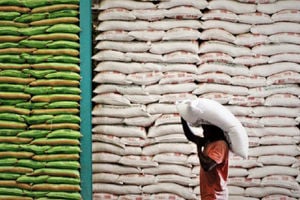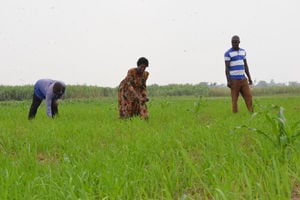
A shop attendant scoops rice from a bag at a shop in Kira, Wakiso District in August 2024. Observers say rice production in Uganda has gone down and as a result prices have increased on the domestic market. PHOTO/FILE
A fresh dispute has emerged between rice sector actors and officials from the Ministry of Trade and Industry over plans to issue permits for the duty-free importation of 100,000 metric tonnes of white rice, valued at approximately Shs199.7 billion.
The permits would allow traders to import milled white rice from outside East Africa.
Industry stakeholders have raised concerns about the economic repercussions of this move, including a potential loss of Shs227.9 billion in taxes and a significant reduction in local rice production.
Gen Wilson Mbasu Mbadi, the State Minister for Trade, was unavailable for comment as his phone was off.
Shortage of rice
However, ministry sources informed Monitor that some officials are advocating for Cabinet approval to address what they claim is a shortage of rice, which has driven up prices.
“The importation is intended to avert a food crisis. Rice has generally been scarce on the market, which has resulted in a hike in prices. That is what the move is intended to address,” an official in the Ministry said.
Tax Concerns
Uganda Revenue Authority (URA) sources estimate the customs value of the proposed imports at $520 (about Shs1.9 million) per metric tonne, bringing the total value to $52 million (approximately Shs200 billion).
Normally, such imports would attract a 75 percent import duty of Shs149.9 billion, 18 percent VAT of Shs62.9 billion, 6 percent withholding tax of Shs11.9 billion, and a 1.5 percent infrastructure levy of Shs2.9 billion.
Despite the potential tax losses, the URA's Public and Corporate Affairs Manager, Mr Robert Kalumba, stated that the tax authority had not been formally informed of the duty-free import plan.
He strongly opposed it, saying: “We do not support the importation of duty-free rice! We have enough local food, and for those who enjoy rice, there is enough grown in Uganda and the EAC region, all tax-free. If people want imported rice brands, they should pay the relevant taxes.”
Mr Kalumba also emphasised that duty-free imports would undermine efforts to boost tax collection, noting that URA aims to raise Uganda’s tax-to-GDP ratio from 13 percent to 18 percent by the end of FY 2024/2025.
He warned that the planned imports could jeopardize this goal.
Opposition from rice growers
Rice growers, millers, and importers are pushing back, arguing that the shortages claimed by the Ministry of Trade are unfounded.
Mr Phillip Idro, the chairman of the Rice Millers Association of Uganda, accused officials of acting out of greed.
“Last year, the President refused this importation, but some people want to do it now to make money,” he said.
Mr Idro referred to a similar attempt in April last year, when officials sought cabinet approval to import 300,000 metric tonnes of white rice, which would have resulted in tax waivers worth Shs563.3 billion if approved.
He warned that if the Cabinet endorses the new plan, it could devastate an industry already struggling due to cheap rice imports from Tanzania.
Importers’ concerns
Importers have long complained about the influx of rice from Tanzania, including some of the 500,000 metric tonnes of duty-free rice Kenya imported earlier this year to mitigate the effects of drought.
Much of this rice is repackaged in Tanzania and sold in Uganda as an East African Community product, exempt from import duties.
Mr Michael Bagenda, a manager at SWT Uganda, one of the country’s largest rice importers, confirmed that this has affected their business.
“Our customers in Kampala who used to buy rice imported directly from Pakistan are now hesitant because they can get the same rice at lower prices, as EAC imports don’t pay import duty, VAT, or the infrastructure levy. They’re only subjected to 6 percent withholding tax,” Mr Bagenda said.
He added that customers have reported paying Shs150,000 for rice that SWT sells for Shs200,000, due to the cheaper imports from Tanzania.
Farmers’ fears
Farmers are also alarmed. Mr Venugopal Pookat, the managing director and CEO of Kibimba Limited, a large-scale commercial rice farm, expressed concern about the impact of duty-free imports on the local market.
“As always, we are not in favour of duty-free imports, as they affect the market for domestic produce. We focus on domestic farming and import substitution,” he said.
Mr Job Okello, a rice miller from Tororo and Secretary General of the Rice Millers’ Council, called the planned imports contradictory to government poverty alleviation programs, warning they would harm local production.
“Farmers won’t be able to sell their rice if the market is flooded with cheap imports. Household incomes will suffer, and farmers may be forced to switch to other crops,” Mr Okello said.
He noted that the price of paddy rice has already dropped from Shs1,600 to Shs1,200 per kilogramme, and duty-free imports would only exacerbate the problem.
“If you bring in cheap duty-free rice, you’re promoting farmers in Vietnam, Pakistan, and India, not our own,” he added.
Fears of further impact
Concerns have also been raised about rice imported into Kenya in May under a tax-free provision aimed at addressing rice shortages.
The government cleared an additional 34,614.5 metric tonnes of white milled rice that had been delayed at the port of Mombasa.
Much of this rice is expected to end up in Uganda via Tanzania, further impacting local farmers and the rice industry.




